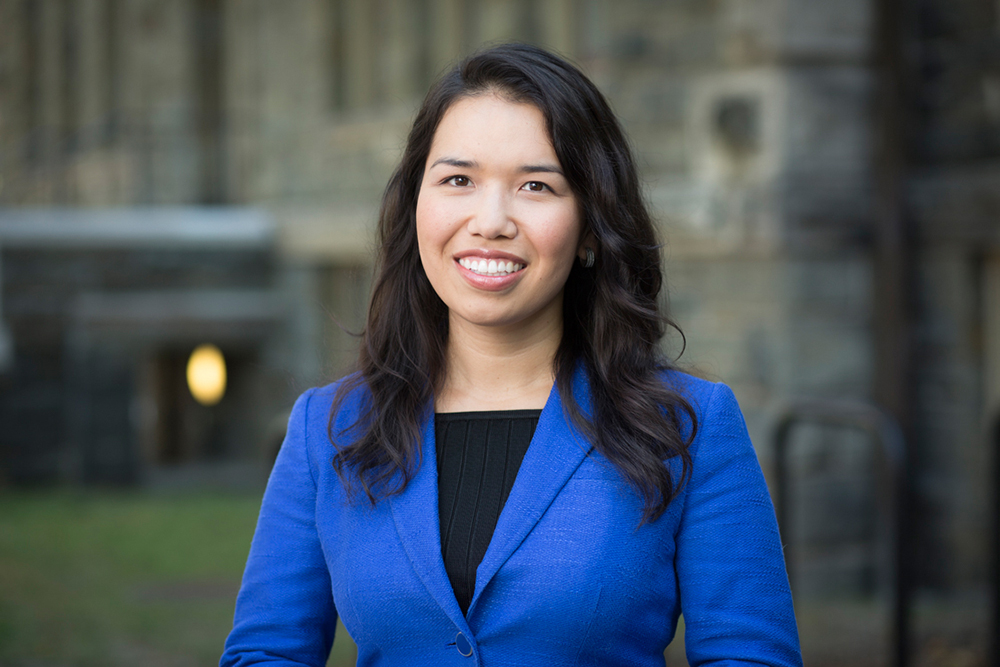Cornell professors testify before House committee
By Blaine Friedlander


Capitol Hill met East Hill as the U.S. House Committee on Foreign Affairs tapped two Cornell professors for their expertise on the economics of international food aid and the realities of Chinese-American relations Oct. 7 in Washington, D.C.
Christopher Barrett, the Stephen B. and Janice G. Ashley Professor and the David J. Nolan Director of the Charles H. Dyson School of Applied Economics and Management, testified at a hearing to reform international food aid. Jessica Chen Weiss, associate professor of government, reviewed the recent state visit by China’s president before the Foreign Affairs Subcommittee on Asia and the Pacific.
During the morning hearing, Barrett said: “The body of research on food aid is extraordinarily clear. Restrictions imposed on U.S. international food-aid programs waste taxpayer money at great human cost. Relative to the reformed food assistance programs operated by other countries and by private nonprofit agencies, the costs of U.S. food aid are excessive, delivery is slow and the programs have not kept pace with global emergency needs.”
In striving to change the status quo, Barrett explained a lack of evidence – over decades – of direct benefits to American agriculture, maritime employment or military readiness. “No debate remains among serious scholars who have studied the issue: U.S. food aid reform is long overdue,” he said.
Barrett, a fellow at Cornell’s Atkinson Center for a Sustainable Future, offered four ideas for reform to house members: Eliminate restrictions against sending cash for international food assistance; terminate monetization of non-emergency food aid; stop the earmark that protects less-productive nonemergency food aid over emergency assistance; and halt cargo preference, for its modern inefficiencies.
Regarding cargo, federal laws require that at least half of food aid must be shipped on U.S.-flagged ships. “This policy, like most anti-competition regulatory restrictions, drives up costs,” said Barrett, who said the laws inflate ocean freight costs by 23 to 46 percent. “The net result is that $40-50 million appropriated each year to feed starving children gets diverted to windfall profits to – mainly foreign – shipping lines,” he said.
By U.S. federal law, 15 percent of non-emergency, international food aid must be monetized – the practice of selling donated U.S. commodities to recipient countries. Monetization uses U.S. taxpayer dollars to purchase international freight services and food that development organizations sell in recipient country markets for 70-75 cents on the dollar.
“Put simply, monetization loses money for no benefit,” Barrett said. “The Government Accounting Office estimated that the inefficiency of the monetization process reduced funding available for development projects by more than $70 million annually.”
Barrett told the representatives, “We can do better.”
In the afternoon, Weiss testified about Chinese President Xi Jinping’s September U.S. tour to visit business leaders, address the United Nations and attend a state dinner.
“President Xi’s visit produced modest but measurable progress in managing the growing frictions in our relationship with China,” said Weiss. “The large number of business and industry leaders who participated underscores the continued importance of our economic relationship with China. President Xi’s speeches reflected his recognition of American concerns, particularly among the business community.”
In written testimony, Weiss explained that the joint agreement for the U.S. and China to refrain from knowingly supporting or conducting cybertheft of intellectual property or trade secrets marked an important step toward establishing new rules of the road in cyberspace.
“President Xi also used the weight of his words to reiterate China’s commitment to a market-based exchange rate and to curb greenhouse gases through a cap-and-trade system,” Weiss said. “Implementing these policy priorities will undoubtedly be fraught with challenges. But the direction underscores China’s desire to address international concerns in line with continued domestic reforms.”
Weiss reminded the representatives that in 2001, China had 34 million Internet users and that number exceeds 700 million users today. “The Chinese government may have the ability to shut down conversation online, but it is increasingly costly for the government to do so, both in manpower and in the eyes of the Chinese public, particularly when it is popular expressions of patriotism that the government is repressing,” she said.
Weiss ended her testimony on a promising note. “Chinese leaders are tough but pragmatic, picking and choosing their opportunities and battles, and knowing when to wait for another day,” she said. “To manage our differences and build upon the modest but measurable progress we have already made requires the hard work of tough, sustained engagement rather than the fiery posturing that is all too easy for voices on both sides to indulge.”
Media Contact
Get Cornell news delivered right to your inbox.
Subscribe